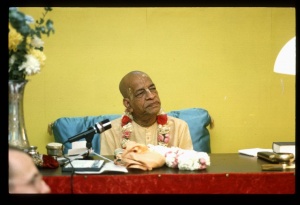CC Madhya 24.120: Difference between revisions
m (1 revision(s)) |
(Vanibot #0054 edit - transform synonyms into clickable links, which search similar occurrences) |
||
| (One intermediate revision by one other user not shown) | |||
| Line 1: | Line 1: | ||
{{ | [[Category:Sri Caitanya-caritamrta - Madhya-lila Chapter 24|C120]] | ||
<div style="float:left">'''[[Sri Caitanya-caritamrta|Śrī Caitanya-caritāmṛta]] - [[CC Madhya|Madhya-līlā]] - [[CC Madhya 24|Chapter 24: The Sixty-One Explanations of the Atmārāma Verse]]'''</div> | |||
<div style="float:right">[[File:Go-previous.png|link=CC Madhya 24.119|Madhya-līlā 24.119]] '''[[CC Madhya 24.119|Madhya-līlā 24.119]] - [[CC Madhya 24.121|Madhya-līlā 24.121]]''' [[File:Go-next.png|link=CC Madhya 24.121|Madhya-līlā 24.121]]</div> | |||
{{CompareVersions|CC|Madhya 24.120|CC 1975|CC 1996}} | |||
{{RandomImage}} | |||
==== TEXT 120 ==== | ==== TEXT 120 ==== | ||
<div | <div class="verse"> | ||
akleśāṁ kamala-bhuvaḥ praviśya goṣṭhīṁ | :akleśāṁ kamala-bhuvaḥ praviśya goṣṭhīṁ | ||
kurvantaḥ śruti-śirasāṁ śrutiṁ śruta-jñāḥ | :kurvantaḥ śruti-śirasāṁ śrutiṁ śruta-jñāḥ | ||
uttuṅgaṁ yadu-pura-saṅgamāya raṅgaṁ | :uttuṅgaṁ yadu-pura-saṅgamāya raṅgaṁ | ||
yogīndrāḥ pulaka-bhṛto navāpy avāpuḥ | :yogīndrāḥ pulaka-bhṛto navāpy avāpuḥ | ||
</div> | </div> | ||
| Line 14: | Line 18: | ||
==== SYNONYMS ==== | ==== SYNONYMS ==== | ||
<div | <div class="synonyms"> | ||
''[//vanipedia.org/wiki/Special:VaniSearch?s=akleśām&tab=syno_o&ds=1 akleśām]'' — without material trouble; ''[//vanipedia.org/wiki/Special:VaniSearch?s=kamala&tab=syno_o&ds=1 kamala]-[//vanipedia.org/wiki/Special:VaniSearch?s=bhuvaḥ&tab=syno_o&ds=1 bhuvaḥ]'' — of Lord Brahmā, who took his birth from the lotus flower; ''[//vanipedia.org/wiki/Special:VaniSearch?s=praviśya&tab=syno_o&ds=1 praviśya]'' — entering; ''[//vanipedia.org/wiki/Special:VaniSearch?s=goṣṭhīm&tab=syno_o&ds=1 goṣṭhīm]'' — the association; ''[//vanipedia.org/wiki/Special:VaniSearch?s=kurvantaḥ&tab=syno_o&ds=1 kurvantaḥ]'' — continuously performing; ''[//vanipedia.org/wiki/Special:VaniSearch?s=śruti&tab=syno_o&ds=1 śruti]-[//vanipedia.org/wiki/Special:VaniSearch?s=śirasām&tab=syno_o&ds=1 śirasām]'' — of the topmost Vedic knowledge; ''[//vanipedia.org/wiki/Special:VaniSearch?s=śrutim&tab=syno_o&ds=1 śrutim]'' — hearing; ''[//vanipedia.org/wiki/Special:VaniSearch?s=śruta&tab=syno_o&ds=1 śruta]-[//vanipedia.org/wiki/Special:VaniSearch?s=jñāḥ&tab=syno_o&ds=1 jñāḥ]'' — who are expert in Vedic knowledge; ''[//vanipedia.org/wiki/Special:VaniSearch?s=uttuṅgam&tab=syno_o&ds=1 uttuṅgam]'' — very high; ''[//vanipedia.org/wiki/Special:VaniSearch?s=yadu&tab=syno_o&ds=1 yadu]-[//vanipedia.org/wiki/Special:VaniSearch?s=pura&tab=syno_o&ds=1 pura]-[//vanipedia.org/wiki/Special:VaniSearch?s=saṅgamāya&tab=syno_o&ds=1 saṅgamāya]'' — for going back home, back to Godhead, to Dvārakā; ''[//vanipedia.org/wiki/Special:VaniSearch?s=raṅgam&tab=syno_o&ds=1 raṅgam]'' — to Raṅga-kṣetra; ''[//vanipedia.org/wiki/Special:VaniSearch?s=yogī&tab=syno_o&ds=1 yogī]-[//vanipedia.org/wiki/Special:VaniSearch?s=indrāḥ&tab=syno_o&ds=1 indrāḥ]'' — great saintly persons; ''[//vanipedia.org/wiki/Special:VaniSearch?s=pulaka&tab=syno_o&ds=1 pulaka]-[//vanipedia.org/wiki/Special:VaniSearch?s=bhṛtaḥ&tab=syno_o&ds=1 bhṛtaḥ]'' — being spiritually pleased; ''[//vanipedia.org/wiki/Special:VaniSearch?s=nava&tab=syno_o&ds=1 nava]'' — nine; ''[//vanipedia.org/wiki/Special:VaniSearch?s=api&tab=syno_o&ds=1 api]'' — although; ''[//vanipedia.org/wiki/Special:VaniSearch?s=avāpuḥ&tab=syno_o&ds=1 avāpuḥ]'' — achieved. | |||
</div> | </div> | ||
| Line 21: | Line 25: | ||
==== TRANSLATION ==== | ==== TRANSLATION ==== | ||
<div | <div class="translation"> | ||
"'The nine Yogendras entered Lord Brahmā’s association and heard from him the real meaning of the topmost Vedic literatures, the Upaniṣads. Although the Yogendras were already conversant in Vedic knowledge, they became very jubilant in Kṛṣṇa consciousness just by listening to Brahmā. Thus they wanted to enter Dvārakā, the abode of Lord Kṛṣṇa. In this way they finally achieved the place known as Raṅga-kṣetra.' | |||
</div> | </div> | ||
| Line 28: | Line 32: | ||
==== PURPORT ==== | ==== PURPORT ==== | ||
<div | <div class="purport"> | ||
This is a quotation from the Mahā Upaniṣad. | This is a quotation from the ''Mahā Upaniṣad''. | ||
</div> | </div> | ||
__NOTOC__ | |||
<div style="float:right; clear:both;">[[File:Go-previous.png|link=CC Madhya 24.119|Madhya-līlā 24.119]] '''[[CC Madhya 24.119|Madhya-līlā 24.119]] - [[CC Madhya 24.121|Madhya-līlā 24.121]]''' [[File:Go-next.png|link=CC Madhya 24.121|Madhya-līlā 24.121]]</div> | |||
__NOTOC__ | |||
__NOEDITSECTION__ | |||
Latest revision as of 23:01, 19 February 2024

A.C. Bhaktivedanta Swami Prabhupada
TEXT 120
- akleśāṁ kamala-bhuvaḥ praviśya goṣṭhīṁ
- kurvantaḥ śruti-śirasāṁ śrutiṁ śruta-jñāḥ
- uttuṅgaṁ yadu-pura-saṅgamāya raṅgaṁ
- yogīndrāḥ pulaka-bhṛto navāpy avāpuḥ
SYNONYMS
akleśām — without material trouble; kamala-bhuvaḥ — of Lord Brahmā, who took his birth from the lotus flower; praviśya — entering; goṣṭhīm — the association; kurvantaḥ — continuously performing; śruti-śirasām — of the topmost Vedic knowledge; śrutim — hearing; śruta-jñāḥ — who are expert in Vedic knowledge; uttuṅgam — very high; yadu-pura-saṅgamāya — for going back home, back to Godhead, to Dvārakā; raṅgam — to Raṅga-kṣetra; yogī-indrāḥ — great saintly persons; pulaka-bhṛtaḥ — being spiritually pleased; nava — nine; api — although; avāpuḥ — achieved.
TRANSLATION
"'The nine Yogendras entered Lord Brahmā’s association and heard from him the real meaning of the topmost Vedic literatures, the Upaniṣads. Although the Yogendras were already conversant in Vedic knowledge, they became very jubilant in Kṛṣṇa consciousness just by listening to Brahmā. Thus they wanted to enter Dvārakā, the abode of Lord Kṛṣṇa. In this way they finally achieved the place known as Raṅga-kṣetra.'
PURPORT
This is a quotation from the Mahā Upaniṣad.